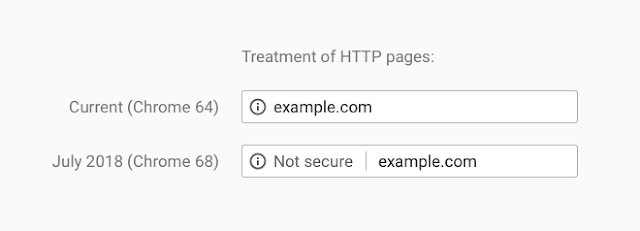Starting in July 2018, all non-secure websites without an SSL certificate will be marked as “insecure” by Google Chrome. In the URL bar at the top of the page, the newest Google Chrome update will now clearly state that a website without an SSL certificate is considered insecure.

At some point in the future, chrome will make this even more explicit:

What is an SSL certificate?
You may have noticed that some URLs are slightly different than others. Some start with an http:// and some with https:// The clue is in the single letter “s” – it indicates that the website has an SSL certificate installed. SSL stands for “Secure Sockets Layer” and is made up of small data files that digitally bind a cryptographic key to an organisation’s details. When installed on a web server, it activates the padlock and the https protocol and allows secure connections from a web server to a browser. Typically, SSL is used to secure credit card transactions, data transfer and logins, and more recently is becoming the norm when securing browsing of social media sites.
Where can I get an SSL certificate?
SSL certificates are typically purchased via your website hosting company. They usually offer a variety of certificates depending on the size of your site and site specific requirements. Larger hosting packages usually include and SSL certificates, whereas budget hosting plans require an SSL certificate to be purchased separately. Some webhosts also offer a certificate via “Let’s Encrypt SSL Support“, which is free and suitable for smaller websites.
Once installed it is important to redirect all website queries from http to https, either via a plugin or your robots.txt files. While this is a relatively simple process, it does require some checks, especially for WordPress websites, to ensure that the site isn’t broken. Please contact me if you would like me to assist with this.
So will google give a secure SSL website priority in their search engine results?
As with anything to do with google, there is always immediate speculation about wether this will positively affect a website’s ranking. While there has not been an explicit statement from google that that it will actively improve your ranking, there are lots of indicators that this is the case:
- Over 40% of the sites on the first page of Google are HTTPS, which is not a surprise, since Google did state a few years ago that they favour HTTPS sites.
- Website speed. Although I’m not 100% convinced that HTTPS is always faster than HTTP, in most cases it does lead to a speed boost. And it is assumed that faster websites are favoured by google.




